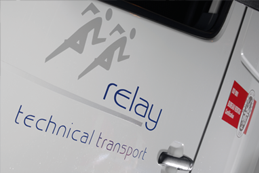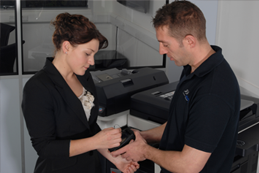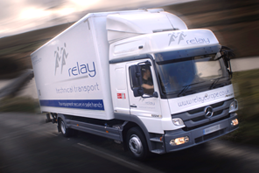Relay has been established for over 30 years and started its operations transporting rigging equipment during the North Sea oil boom. Since then there have been huge changes in the transport and logistics sector and our own business has altered radically as well as expanding dramatically.
As a specialist in handling fragile and valuable electronic equipment, Relay has always  realised that customers require and deserve a particularly high level of advice and technical support. There is no room for error when dealing with assets that are vital requirements to end users in sectors such as business, science and healthcare.
realised that customers require and deserve a particularly high level of advice and technical support. There is no room for error when dealing with assets that are vital requirements to end users in sectors such as business, science and healthcare.
In both transport logistics services in the UK and international freight forwarding operations, consistency of commitment has to be shown at every level. This includes not only from office and depot management and staff but also the people at the front end. Delivery crews are the ambassadors for transport companies and their customers. Their importance can’t be emphasised enough!
This customer service quality requirement, and the importance of having delivery crews trained to provide it, has been increasingly recognised among haulage companies and others involved in freight services. In the last 30
years logistics operations have become infinitely more sophisticated and orientated towards personal service. In parallel with this, supply chains have grown to be more closely connected, controlled and secure.
Changes in Communications
When we began our operations, there was no internet. There were also no smartphones or handheld electronic devices to capture and communicate data. This meant that a trail of paper accompanied each assignment and customers invariably and unavoidably lost touch with their goods at some time during transit. Since then there have been marked positive changes and projects can now not only be handled infinitely more smoothly and efficiently than 30 years ago but can be seen to be done so each step of the way.
Web based technology has revolutionised every aspect of supply chain solutions. Perhaps most importantly, it has created total visibility from point of collection to point of delivery through GPRS satellite tracking, real-time electronic POD retrieval and other observation methods. Customers know at any time where their goods on route are located and can have full details of the outcome of the delivery in real time.
 This level of accurate and sophisticated monitoring extends to warehousing facilities as well as logistics transport. For instance, our Warehouse Management System (WMS) provides for higher levels of inventory accuracy and gives customers online visibility of their stock levels through its web based reporting tools.
This level of accurate and sophisticated monitoring extends to warehousing facilities as well as logistics transport. For instance, our Warehouse Management System (WMS) provides for higher levels of inventory accuracy and gives customers online visibility of their stock levels through its web based reporting tools.
The WMS is fully integrated with our order processing software and can create real time pick instructions sent via radio frequency (RF) to barcode scanners where stock and locations will be scanned. This RF technology enables us to update order fulfilment and stock levels accurately and rapidly.
Investment in IT and telecommunications technology is essential for the continued improvements in the efficiency and security of the supply chain. Relay has always made IT investment a number one priority and our IT transport partnership with Mandata is a valuable component of our operations as a logistics company.
Additionally, the development of EDI has made a fantastic contribution to the speed and facility of order processing. This has created greater efficiencies and increasingly seamless transactions between suppliers and customers.
Changes in Transport Patterns
The Department for Transport’s (DfT) recent “National Travel Survey: England 2013” gives a useful overview of the number and character of journeys made in the country. This in turn shows the overall environment in which the freight transport sector operates.
“The average distance people travel per year has increased by 47%. Most of this growth occurred during the 1970s and 1980s and was largely due to an increase in average trip lengths, which have risen by 52% since the early 1970s.
Trip rates increased until the mid-1990s, but have since fallen and are below the 1970s level.”

The snapshot view take by the survey, comparing 1972/73 with 2013, shows that the number of trips taken is down 4%, but the distance is up 47% and trip times up 3%. In 2013, 70% of the total distance travelled was by cars and vans, as compared with rail and other forms of road transport or walking and cycling. The number of adults holding driving full licences has risen from 48% over the whole UK in 1975/76 to 74% (32 million) in England alone
(National Travel Survey statistical criteria have recently changed in line with increased devolution within the Home Nations, so do not now cover the UK as a whole).
Between 2003 and 2013, according to the Road Users’ Alliance, while UK traffic mileage has decreased on some classes of urban and rural roads, there has been a marked increase of 11.18% in motorway traffic, from 93.0 to 103.4 billion vehicle km. This increased motorway usage tallies with the extended journey findings of the National Travel Survey and shows the demands on long-distance infrastructure and the consequent pressures affecting transport and logistics operations.
A transportation specialist like Relay has a range of objectives to fulfil in carrying out effective project and journey management. These include:
- Maintaining agreed delivery schedules
- Assuring the safety and security of equipment being transported
- Utilising manpower and resources as effectively as possible
- Minimising operating costs, including fuel consumption
- Reducing the environmental impact of our operations
Our response has included making sure that our fleet offers the maximum flexibility to meet a wide range of freight transport requirements. In our recent fleet expansion, we have worked on the premise that increased load capacity means fewer journeys.
This in turn reduces fuel consumption, benefitting the environment as well as making our services more competitive for our customers. Additionally, all our new vehicles being Euro 6 compliant means that they fulfil the highest environmental specifications.

For handling larger consignments, our new Mercedes Atego 12 tonne and 18 tonne trucks offer an excellent load capacity. All these vehicles are dual compartment and fitted to Relay’s bespoke specifications to ensure equipment safety and security. We have also had the sleeper cabs changed to crew cabs, allowing for the option of an extra crew member in the vehicles when required.
The need to operate in highly congested urban areas makes our new extra lightweight 7.5 tonne trucks equally invaluable. The exceptionally well designed load area of these vans allows for between one and 1.2 tonnes more goods on board than could normally be expected in vehicles of this tonnage.
Both in the UK and operations overseas, the integrity of supply chain solutions has to be rigorously monitored and maintained. Experience over 30 years has proved the vital need for ensuring that every component of the supply chain, including every outside service provider used for international freight forwarding shipments, meets the
highest standards of professionalism and service.
Both nationally and internationally, the transport and logistics sector is subject to increasing regulations, including environmental factors such as the safe disposal of waste. There are also many demands on effective supply chain management relating to operational pressures and costs as well as security issues.
Fortunately we have the team commitment, high quality communications tools and equipment resources to meet this changing logistics environment. We have always been enthusiastic about our dynamic industry and are very optimistic for the future over the next 30 years!